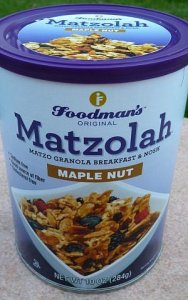Annual convention shows the kosher and calorie-minded food industries are each taking a page from the other’s cookbook.
SECAUCUS, N.J. — When Scott Gantwerker and Wayne Silverman were roommates 40 years ago at Michigan State University, they regularly made granola.
“Then came Passover, and we couldn’t make it — until Wayne started using matza,” Gantwerker recalls. “He sent Passover granola each year to family and friends.”
After graduation, Gantwerker went on to a career in the food industry, working for such companies as Quaker Oats, Pepsi and Pepperidge Farm. Silverman, for his part, embarked on a career at communal organizations, including leadership roles at the Jewish Federation in Austin, Texas, and Hillels of Georgia. But the two men never lost their love for granola, and eventually found their way back to it — and each other.
“We put our careers on pause so we could do it full-time,” says Gantwerker, speaking at Kosherfest 2012, where the pair’s holiday-friendly cereal — branded Matzolah — was named the best new kosher-for-Passover food.
‘Most Passover breakfast products are so bland that the box often tastes better than what’s inside’
“Most Passover breakfast products are so bland that the box often tastes better than what’s inside,” Silverman says. “So I experimented with making a delicious granola that had matza and quality ingredients that were permitted on the holiday” — such as coconuts, California raisins and three types of nuts.
Foodman LLC, which makes and markets Matzolah, was one of 325 companies promoting their wares earlier this month at Kosherfest, the annual trade show of the kosher food industry. Now in its 24th year, the convention attracts thousands of kashrut professionals to Secaucus, NJ, where visitors range from chefs and cookbook writers to representatives of supermarket chains, specialty food stores and Jewish summer camps. Much is at stake for those with products to push: Already valued at $12.5 billion, the kosher food market is growing at an annual rate of 15 percent, according to a 2010 study by Lubicom Marketing and Consulting, which specializes in kosher products.
While Kosherfest showcased a wide spectrum of foods — featured products came from countries including Vietnam, Argentina and the Philippines — a growing number are attempting to capitalize on consumer enthusiasm for health food, highlighting their bona fides as sugar-free, gluten-free, organic or vegan.

On one side, kosher food companies are responding to demand from health-minded customers, with Adama Naturals rolling out a line of meats that contain no nitrates or artificial ingredients. Skinny Kosher Creations offers soy-based meals for those trying to lose weight.
At the same time, some traditionally non-kosher companies have realized that going kosher expands their customer base — and that a kosher label can also have a positive association among the non-observant.
“Even some non-Jews look for the kosher symbol,” says Viki Sater, who runs the Port Washington, NY-based Viki’s Granola. “People associate it with cleanliness. It’s one more certification on a product.”
Like Viki’s Granola, a number of additional nutrition- and fitness-minded companies have obtained kosher status despite having no direct connection to anything Jewish. Kickbutt Amped Energy Ballz, for example, a dietary supplement made in Canada, offered its wares not far from Transition Nutrition’s Bliss Mix, a combination of nuts and dried berries.
While not every Kosherfest product reflected the trend toward healthier eating — high-calorie deli meats, pastries and candy remained in abundance — many traditional Jewish food producers are evolving, creating healthier versions of familiar dishes or venturing into entirely new terrain.
Many traditional Jewish food producers are evolving by creating healthier versions of familiar dishes, or venturing into entirely new terrain
Gold’s, long known for its borscht, horseradish and schav — an Ashkenazi soup — now makes salsa and Wasabi. Manischewitz, synonymous with kiddush wine and gefilte fish, is now described by CEO and co-president Alain Bankier as “a food company which happens to be kosher.” Having “rebranded and expanded,” in Bankier’s words, “to be better, healthier, tastier,” the company now offers products such as Moroccan roasted vegetables; a chicken couscous sauce; a flaxseed bar made with almonds and cranberries; and “exotic root” vegetable chips.
If the number of visitors lining up for a sample was any indication, however, Kosherfest’s most popular new item was relatively healthy — at least on the scale of kosher desserts.
Gelato Petrini’s chocolate/peanut butter gelato, made with soy milk, received the convention’s awards for best new dessert and best overall new product. Dawn Petrini, the company’s director of sales and marketing, emphasized its benefits for the calorie-conscious: “Gelato is a healthy, natural alternative to ice cream. It tastes great and satisfies that little urge for something sweet.”
As one of the gathering’s biggest hits, the company has high hopes for how its product will do among kosher consumers.
“Now that we’ve moved from a 500- to a 7,500-square-foot plant,” Petrini said, “we just hope we can satisfy the demand.”
(Source: http://www.timesofisrael.com)
